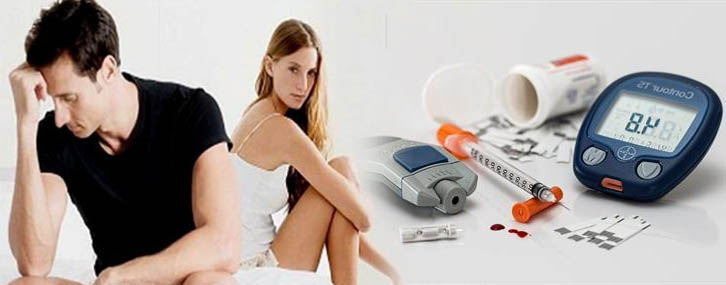44% of Diabetics Suffer Sexual Problems: Study
Increased blood sugar levels can pose a big problem for a couple in the bedroom. For the first time, doctors have found that at least 44% of diabetics in Chennai suffer from erectile dysfunction (ED).
ED is the consistent inability of men to achieve or sustain an erection of sufficient rigidity to permit satisfactory sexual intercourse. Premature ejaculation, one of the most common forms of ED, is the inability to maintain an erection long enough for sexual satisfaction.
The study, conducted by the MV Hospital for Diabetes, screened 423 diabetics during the past year. Among them, 188 patients had some form of ED. In 49%, the symptoms were mild; 33% had moderate symptoms; and more than 18% had severe symptoms. The study, published in the Journal of Association of Physicians in India, also showed that 37.8% of diabetics had problems of premature ejaculation.
“We found that one of the important reasons for ED was poor blood supply,” said diabetologist Dr. N. Anandan, who led the research team.
CAUSE FOR WORRY
- Diabetes present in 17% of the city’s population
- Six-fold increase in the disease in the past 3 decades
- Though erectile dysfunction is not life-threatening, it can wreck marriages
There is one fact several doctors across specialties point to as the most common cause for a range of diseases and disorders: Lifestyle. And now, the result is beginning to embarrass many men in their bedrooms.
Last month, actor Manorama submitted a petition to chief minister M Karunanidhi urging the state to bring in a legislation that would ensure that men and women submit their medical certificate stating they do not have sexual dysfunction before marriage. Doctors say legislation might not be an ideal solution.
Rising impotency, particularly erectile dysfunction, has increased the number of outpatients at several doctor’s clinics. Those like Dr. Gautam Banga see more than 40 patients a day compared to the early 80s when he had only about 30 patients in a year.
While awareness has played a role, Dr. Banga says, lack of exercise and high-stress jobs have increased the problem. Impotency can be primary or secondary. While, primary impotence occurs early in sexual life, men cannot achieve erection after a certain age suffers from what is called secondary impotence. Sexual dysfunction can be physical or psychological. Physical impotence is caused by trauma or underlying disease. It could even be drug-induced. Alcohol consumption or smoking can also lead to impotence. Some men who are extremely successful in their career and have been tagged as the most eligible bachelor have waited outside his clinic desperately for cure. Studies have shown that ED is a common disorder. About 10% men below the age of 40 suffer from it, while the prevalence is 40% among men in the age group of 40-60 years and 70% among those between 60 and 70 years.
Senior cardiothoracic surgeon Dr. KM Cherian says Indian are prone to cardiac disorders ten years earlier than others. Diabetologist Dr. V Mohan says he is seeing even school children with high incidence of obesity and diabetes. “If they get diabetes early, the complications of the disorder naturally set in early,” says Dr. Mohan. Studies from the West have shown that ED is a powerful predictor of cardiovascular death in diabetic patients with silent cardiac disease, besides other complications of kidney, eye and the nervous system. Experts are unanimous in their prescription to prevent or delay such complications: A balanced diet and adequate exercise.
A study in the US published in Mayo Clinic proceedings in February 2009 had shown that coronary artery disease incidence density per 1,000 person years for men without ED was 0.9 in men aged 40-49 years, while it was 48.5 among men aged 40-49 years with ED.
“Our study highlights the importance of screening diabetic patients for ED since the prevalence of this silent complication seems to be quite high.,” said diabetologist Dr. N. Anandan, Hospital for Diabetes, Chennai.
Earlier studies, such as the Chennai Urban Population Studies (CUPS), had shown diabetes prevalence to be an estimated 17% in Chennai. More than half the people with the disease already had an onset of complications, and a large number was detected with diabetes early in life.
“ED may not by itself be life threatening, though it could leave many men frustrated and even wreck marriages. But its presence precedes other manifestations of systematic blood clots that may lead to heart attack, stroke or vascular diseases — the most common complications of diabetes. We have observed that people affected by ED are those who have had elevated sugar levels for several years,” Dr. N. Anandan said.
The study has caused concern among experts who fear that an entire range of complications could increasingly affect a younger group of patients. With a six-fold increase in diabetes in the past three decades and an increasing number of young patients being detected with ED, sexologists like Dr. Rajesh Taneja Reddy fear that people could have ED even before marriage. “It’s a serious social threat that has to be attended to immediately,” he said.



